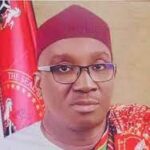The United Nations (UN) Advisor on the Northeast Humanitarian Initiative, Maj-Gen. Moses Bisong Obi (Rtd), has said that despite the military relinquishing power to the civilian administrations, they cannot be entirely confined to the barracks.
Obi, who is also of the United Nations Office for the Coordination of Humanitarian Affairs (UNOCHA), spoke in Abuja on Thursday at the Civil-Military Relations Accountability Forum, organised by the CLEEN Foundation, National Endowment for Democracy (NED) and the Institute for Peace and Conflict Resolution (IPCR) as part of measure to deepen the Civil Military Relations (CMR).
According to him, it is wrong to assume that the military, comprising all security agencies now, should be confined to the barracks, when they are also citizens that need to positively contribute to nation building.
“Though the military are back to the barracks from ruling the country, they are still important to societal development, hence the need to understand ourselves and relate very well with each other, then the need to interact and understand our roles to each other.
“I served as heads of battalion and brigade around 1998 or 1999 on a special operation to flush our bandits in Zamfara. It was the cordial relationship with the civil populace that helped in achieving success of the operation,” Obi said.
He said that apart from the problem of insurgency in the country being undertaking by the military, there is also the issue of flooding across the country that sometimes requires military intervention.
“When we have this kind of emergencies like we have in the Northeast. We must cooperate and coordinate, otherwise, we would not be able to make headways,” he said.
The Executive Director of the CLEEN Foundation, Dr. Benson Olugbuo, said the forum is part of ‘Fostering Civil Military Relations’ NED funded project, with objective to strengthen civil-military relations through sustained dialogues and improved understanding between the military and civilians to improve accountability, security and respect for human rights.
“The relations between the security personnel and civil society continue to be fraught with mistrust, tension, limited interaction and fear. This state of affairs is deeply rooted in histories, current security challenges and the shrinking space for civil liberties in Nigeria that has led to a number of rights violations by security personnel on the citizens.
“Consequently, there has been an increased focus by Nigerians and the international community to spotlight the accountability mechanisms set up by security agencies to address citizens’ complaints against security personnel that bother on human rights abuses. These mechanisms are part of measures to instill public confidence and to position security institutions as rights respecting,” Olugbuo said.
According to him, one of such recent platforms is the Public Complaints Rapid Response Unit (PCRRU) set up in 2015 by the Nigeria Police Force to address complaints from the public as it concerns Police Officers and that the Nigerian Army has equally established a Human Rights Desk within the Directorate of Civil Military Affairs in early 2016 and a call centre to receive complaints against Army personnel.
“Other security agencies also have some internal procedures for holding personnel accountable for actions/inactions. However, one of the missing links in assessing the effectiveness and efficiency of these mechanisms is the voice of the public in strengthening the work of these units. This view is under-scored by the largely opaque feedback mechanisms to complainants to indicate what actions have been or are being taken to address their concerns,” Olugbuo said.

 Join Daily Trust WhatsApp Community For Quick Access To News and Happenings Around You.
Join Daily Trust WhatsApp Community For Quick Access To News and Happenings Around You.


